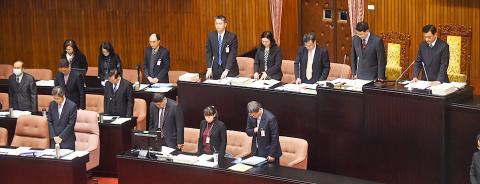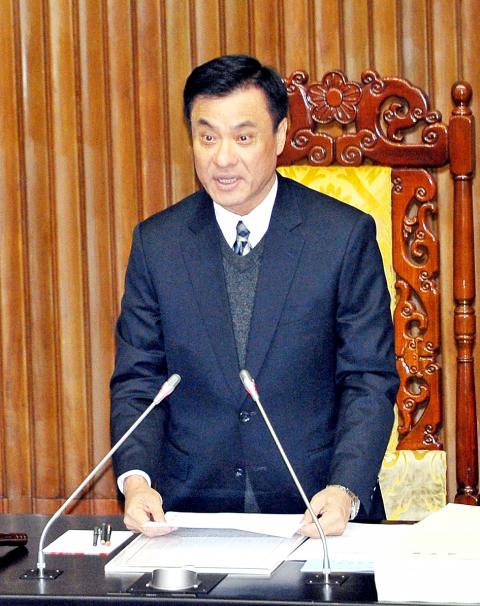The new legislative plenary session opened yesterday, with the Chinese Nationalist Party (KMT), reduced to a minority party after its election rout, blocking draft bills on “ill-gotten party assets” proposed by the Democratic Progressive Party.
The session commenced with Legislative Speaker Su Jia-chyuan (蘇嘉全) leading the legislature and Executive Yuan officials in observing a moment of silence for those who lost their lives in Tainan in the earthquake that struck on Feb. 6.
More than 100 draft acts sailed through their first readings and were referred to legislative committees for review and deliberation during the morning meeting, including draft bills on governing political parties; amendments to the Referendum Act (公民投票法) and the Disaster Prevention and Protection Act (災害防救法); setting up reciprocal offices with China; and the much-discussed legislation on the presidential transition of power.

Photo: Liu Hsin-de, Taipei Times
What did not get through were four bills aiming to deal with ill-gotten party assets proposed by DPP lawmakers, which the KMT caucus opposed and were sent back to the Procedure Committee.
KMT caucus whip Lin Te-fu (林德福) said the regulation of political parties’ assets could be included in the proposed political party act, adding that the KMT opposed the DPP’s bills because they are “apparently targeting [the KMT].”
DPP Legislator Su Chih-fen (蘇治芬) blasted the KMT’s move on Facebook, saying the KMT “still does not understand why it has been spurned by the public even after its 2014 and 2016 electoral routs.”

Photo: CNA
“The political party act is to ensure a fair playing field for all political parties, and the premise for that fairness depends on the act governing ill-gotten party assets stripping away the competitive advantage that the KMT has held for a long time,” Su Chih-fen said.
The DPP, which now holds a majority in the legislature, can choose to counteract the KMT’s move if it is “determined to propose the bill,” Social Democratic Party spokesperson Miao Po-ya (苗博雅) said, adding that according to legislative regulations, a caucus can only block the referral of a bill to a committee when “there are too few lawmakers present to conduct a vote.”
“In other words, if the DPP appoints a sufficient number of lawmakers to attend the first-reading meeting ... the bills could be successfully referred to the committee for review,” Miao added.
Meanwhile, Lin said prior to the general assembly meeting that the KMT caucus does not and would not oppose legislation on the transition of power, but the legislation must not be unconstitutional.
The draft act will not be reviewed until at least the end of next month or the beginning of April after a question-and-answer session, “so the third reading will probably be completed only after the [May 20] presidential transition,” he said.
“Since the proposed bill will not be in effect for this transition, we should take time to review the bill. The most important thing is not to ensure that it does not go against the Constitution, as the version proposed by [the DPP] does in some parts,” Lin added.
KMT Legislator Alicia Wang (王育敏) said the DPP’s version of the legislation, which would restrict the incumbent president’s appointment and decisionmaking powers, would generate controversies, and that since a president is elected to a full four-year term, resigning before their time is up or reducing their effective ruling time is unlawful.
DPP Legislator Wu Ping-jui (吳秉叡) disagreed, asking why “the KMT, when it proposed its version of the presidential transition bill in 2008, which was little different from the one we have now, did it not find it unconstitutional?”

‘FORM OF PROTEST’: The German Institute Taipei said it was ‘shocked’ to see Nazi symbolism used in connection with political aims as it condemned the incident Sung Chien-liang (宋建樑), who led efforts to recall Democratic Progressive Party (DPP) Legislator Lee Kun-cheng (李坤城), was released on bail of NT$80,000 yesterday amid an outcry over a Nazi armband he wore to questioning the night before. Sung arrived at the New Taipei City District Prosecutors’ Office for questioning in a recall petition forgery case on Tuesday night wearing a red armband bearing a swastika, carrying a copy of Adolf Hitler’s Mein Kampf and giving a Nazi salute. Sung left the building at 1:15am without the armband and apparently covering the book with a coat. This is a serious international scandal and Chinese

PERSONAL DATA: The implicated KMT members allegedly compiled their petitions by copying names from party lists without the consent of the people concerned Judicial authorities searched six locations yesterday and questioned six people, including one elderly Chinese Nationalist Party (KMT) member and five KMT Youth League associates, about alleged signature forgery and fraud relating to their recall efforts against two Democratic Progressive Party (DPP) legislators. After launching a probe into alleged signature forgery and related fraud in the KMT’s recall effort, prosecutors received a number of complaints, including about one petition that had 1,748 signatures of voters whose family members said they had already passed away, and also voters who said they did not approve the use of their name, Taipei Deputy Chief Prosecutor

UNDER ATTACK: Raymond Greene said there were 412 billion malicious threats in the Asia-Pacific region in the first half of 2023, with 55 percent targeting Taiwan Taiwan not only faces military intimidation from China, but is also on the front line of global cybersecurity threats, and it is taking action to counter those attacks, President William Lai (賴清德) said yesterday. Speaking at the opening of this year’s Cybersec Expo in Taipei, the president assured foreign diplomats and exhibitors that Taiwan remained committed to strengthening its defense against cyberattacks and enhancing the resilience of its digital infrastructure. Lai referenced a report from the National Security Bureau (NSB) indicating that the Government Service Network faced an average of 2.4 million intrusion attempts daily last year, more than double the figure

COUNTERINTELLIGENCE TRAINING: The ministry said 87.5 percent of the apprehended Chinese agents were reported by service members they tried to lure into becoming spies Taiwanese organized crime, illegal money lenders, temples and civic groups are complicit in Beijing’s infiltration of the armed forces, the Ministry of National Defense (MND) said in a report yesterday. Retired service members who had been turned to Beijing’s cause mainly relied on those channels to infiltrate the Taiwanese military, according to the report to be submitted to lawmakers ahead of tomorrow’s hearing on Chinese espionage in the military. Chinese intelligence typically used blackmail, Internet-based communications, bribery or debts to loan sharks to leverage active service personnel to do its bidding, it said. China’s main goals are to collect intelligence, and develop a